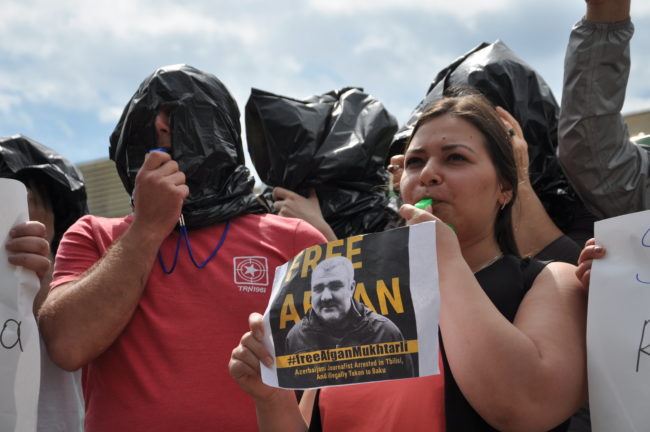

 Georgian authorities have denied accusations that they assisted or were involved in the abduction of self-exiled Azerbaijani journalist Afgan Mukhtarli. Mukhtarli disappeared in Tbilisi on 29 May, only to show up a day later in a Baku jail.
Georgian authorities have denied accusations that they assisted or were involved in the abduction of self-exiled Azerbaijani journalist Afgan Mukhtarli. Mukhtarli disappeared in Tbilisi on 29 May, only to show up a day later in a Baku jail.
‘I understand the concerns of our human rights organisations, but I would like to say that their preliminary conclusions are unacceptable’, Prime Minister Giorgi Kvirikashvili told journalists, urging them to wait for the conclusion of the official investigation.
‘It is unacceptable to discredit caring state institutions’, Kvirikashvili added.
Deputy Prime Minister and Minister of Education Aleksandre Jejelava also reiterated earlier claims that Mukhtarli was not a journalist but a security guard. Jejelava said on 1 June that ‘it has been confirmed that Mukhtarli was head of Azerbaijan’s RFE/RL security service and a freelance journalist as well’.
Mukhtarli’s work includes several investigations into alleged corruption within Azerbaijan’s Ministry of Defence and into the assets of President Ilham Aliyev.
Georgia’s Interior Minister Giorgi Mghebrishvili confirmed that it is possible to cross the Georgian-Azerbaijani border somewhere other than an official crossing point, but that it happens rarely. He repeated that this was Azerbaijan’s official explanation for how Mukhtarli crossed without any official documents, as his passport remained in Tbilisi.
Mghebrishvili also quoted unidentified ‘media sources’, which according to him, have reported that Mukhtarli had planned to cross the border illegally, and that he regularly crosses the border to smuggle money into Azerbaijan. Georgia cannot yet confirm or deny this claim he added.
On 4 May, pro-government Azerbaijani news outlet Haqqin.az published a piece by ex-opposition figure turned government ‘attack dog’, Eynulla Fatullayev, accusing the Georgian authorities of not hindering a supposed plot by Azerbaijani opposition figures in exile in Georgia to overthrow Aliyev’s regime. The article included Mukhtarli’s name along with other opposition figures residing in Tbilisi. Similar publications have appeared in several pro-government Azerbaijani media outlets.
Georgia’s Public Defender Ucha Nanuashvili demanded on his facebook profile that Georgia’s Interior Ministry and State Security Service ‘explain how Mukhtarli ended up going from Tbilisi to Baku, or take political responsibility’.
Mukhtarli was last seen in Georgia by his friend on the evening of 29 May. After failing to return home, he resurfaced again in Azerbaijan charged with what his lawyer calls ‘fabricated charges’. His lawyer Elchin Sadigov told reporters that Mukhtarli had been kidnapped outside his flat in the Georgian capital Tbilisi by a group of unknown, Georgian speaking men, who beat him up and took him to the Azerbaijani-Georgian border, where he was detained by Azerbaijani police. Baku’s Sabail District Court imposed three months of pretrial detention on Mukhtarli on 31 May. He is charged with smuggling €10,000 ($11,200), border trespass, and disobeying border guards.
Many high-profile Azerbaijani opposition figures have recently been denied residency permits in Georgia, prompting accusations that Tbilisi is collaborating with Baku to make life more difficult for Azerbaijani dissidents.
Local human rights organisations and journalists attended rallies in solidarity with Mukhtarli on 31 May and 1 June in front of the Georgian Government Chancellery building and State Security Service in Tbilisi and Batumi. Journalists sent a letter to authorities urging them to disclose further details about Mukhtarli’s case. The non-parliamentary opposition Republican Party demanded the resignation of Jejelava, Mghebrishvili, and State Security Service head Vakhtang Gomelauri.
[Read more on OC Media: Tbilisi-based Azerbaijani journalist abducted to Azerbaijan; Anger as abducted journalist given 3-month pre-trial detention in Baku]








